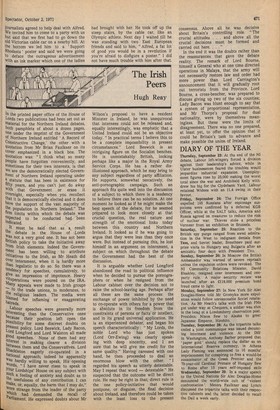The Irish Peers
Hugh Reay
n the printed paper office of the House of Lords two publications had been set out as Material for the Northern Ireland debates, both pamphlets of about a dozen pages, One under the imprint of the Government of Northern Ireland entitled A Record of Constructive Change,' the other with a quotation from Mr Brian Faulkner on its cover emphasized in a black box. The quotation was: "I think what so many People have forgotten conveniently, and sometimes for their own interests, is that we are the democratically elected Government of Northern Ireland operating under a statute that has been in existence for fifty years, and you can't just do alkay With that Government or erase it overnight, especially when you recollect that it is democratically elected and it does have the support of the vast majority of the population in Northern Ireland." The firm limits within which the debate was expected to be conducted 40, been indicated.
It must be said that as u., result the debate in the House of 'fords Was not a very good one. It has not been British policy to take the initiative away from Irish elements. Indeed the Government has been willing to attribute initiatives to the Irish, as Mr Heath did over internment, when it is hardly more than legalistic to do so. So there was a tendency for speeches, cumulatively, to give an impression of impotence. Heavy „vituperations were poured on the IRA. 'vzany appeals were made to Irish groups
to the trade unions, to moderates, to 11-_ie religious leaders. The media were °lamed for inflaming or exaggerating hatreds.
Labour speeches were generally more interesting than the Conservative ones because their position left open the Possibility for some discreet doubts on Present policy. Lord Beswick, Lady Bacon, Lord Longford and Lord Walston all made Pod speeches. None of them had any interest in making clearer a division between them and the Conservatives. Lord Shackleton eagerly co-operated in a national approach; indeed he apparently Was hardly willing to speak. His opening words, " I have never risen to speak in Your Lordships' House on any subject with !nen a feeling of anxiety and doubt as to 'he usefulness of any contribution I can make, or, equally, the harm that I may do," Were strange from the leader of the party Which had demanded the recall of Parliament. He expressed doubts about Mr
Wilson's proposal to have a resident Minister in Ireland, he was unequivocal that internees could not be released and, equally interestingly, was emphatic that a United Ireland could not be an objective today. " In practical terms I believe this to be a complete impossibility in present circumstances." Lord Beswick is an intriguing figure on the Socialist benches. He is unmistakably British, looking perhaps like a major in the Royal Army Service Corps. He has a rather disillusioned approach, which he may bring to any subject regardless of party affiliation. He supports, somewhat tentatively, the anti-pornographic campaign. Such an approach fits quite well into the discussion of a subject to which there is a tendency to believe there can be no solution. At one moment he looked as if he might make the best speech of the debate, for he seemed prepared to look more closely at that crucial question, the real nature and strength of the emotional links today between this country and Northern Ireland. It looked as if he was going to argue that they were less than they once were. But instead of pursuing this, he lost himself in an argument on internment, a subject on which throughout the debate the Government had the best of the discussion.
It is arguable whether Lord Longford abandoned the road to political influence when he decided to pursue the pornographers or when he resigned from the Labour cabinet over the decision not to raise the school-leaving age. Perhaps after all these are the same process: the exchange of power inhibited by the need to co-operate with others for a power that is absolute in its freedom from the constraints of persons or facts or intellect, and in its grand universal application. He is an experienced debater, and began his speech characteristically : "My Lords, the noble Lord who has just spoken (Lord Orr-Ewing) was clearly speaking with deep sincerity, and I am sure that he will give me credit for the same quality." Having caressed with one hand, he then proceeded to deal an enormous blow with the other. "I regarded his speech as utterly detestable. May I repeat that word — detestable." He suspected that the outcome will be direct rule. He may be right in that; direct rule is the one policy-initiative that would postpone, or disguise, the final decision about Ireland, and therefore could be taken with the least loss to the present consensus. Above all he was decisive about Britain's controlling role. "The crucial attitudes . . . and above all the crucial decisions must be formed and carried out here. . . . "
In the end it was the doubts rather than the reassurances that gave the debate reality. The remark of Lord Bourne, himself a General who at one time directed operations in Malaya, that the army will not necessarily restore law and order had more power than Lord Carrington's announcement that it will gradually root out terrorists from the Province. Lord Bourne, a cross-bencher, was prepared to discuss giving up two of the six counties; Lady Bacon was blunt enough to say that a system of proportional representation, and Mr Thorpe's proposal for dual nationality, were by themselves meaningless. But these were the limits of disagreement. There was no one prepared, at least yet, to offer the opinion that it could be Britain's task to advance and make possible the union of Ireland.
































 Previous page
Previous page